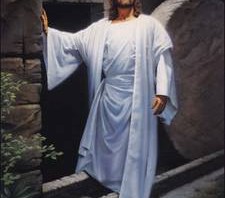I have to let you in on a little secret tonight. Very often, when we preach a homily, the message ends up being for us preachers. It’s not that we set out to do that; actually if we thought about it I’m pretty sure we would avoid it at all costs. It’s just that when we pray about our homily, and we write it with the inspiration of the Spirit, after we preach it, we often sit down and say, “Oh. You were talking to me, weren’t you, God?”
Lent has been like that for me. Back when I picked the theme that we have been using to guide our reflection during these somber days, “Rediscover Our Need for a Savior,” I thought it was a clever way to hearken back to the book we gave out at Christmas, Rediscover Catholicism. But as we’ve reflected and preached our way through Lent, I’ve found the message to be quite personal, more so than I would have intended. I hope that you too have had the opportunity to rediscover a relationship with Christ that maybe wasn’t as fervent as it should be. Lent is supposed to do that for us.
For me, these Triduum days have been amazing reminders of why I need a Savior. As we hear the Scriptures and watch the Liturgy unfold, we can’t help but be reminded of the awesome price our Lord paid for each one of us on that Cross. On Friday, I looked at the cross and remembered it was my sins that put him there. I remembered that it was my brokenness that he suffered to redeem. And most of all, I remembered that God loved me enough that not doing it was completely out of the question. He did that, for me.
We do indeed need a Savior, all of us personally, but also as a society. All you have to do is turn on the news and everything you hear points to a desperate, urgent need for salvation. This world would have us accept the darkness and say it’s good enough. This world would have us live for today, with no thought to an eternity that it really doesn’t acknowledge anyway. This world would say there is no need for a Savior, because we’re good enough to do what we need to do. But the world is dead wrong.
We can’t possibly ever make up for our many sins personally and as a society all by ourselves. We have constantly made choices that take us out of friendship with God and put us on paths that lead nowhere good. If we’re honest, all of us would admit that. It takes a Savior who loves us more than we deserve to set things right.
And the thing is, we have that Savior. Right here and right now. This is the night. Not some distant long-past night, but this night is the night, when Christ broke the prison-bars of death and rose triumphant from the underworld! We keep vigil on this night because our celebration of this Most Holy Vigil brings us into communion with every believer from every time and place and with our Savior as he bursts forth from the underworld.
This night changes everything. The ancient foe is defeated, the sentence of condemnation has been remitted, even sinful Adam is raised up from death to new life. As an ancient homilist wrote in today’s Office of Readings, “God has died in the flesh and hell trembles with fear.” No power of any kind can keep our God’s salvation from coming to fruition. Christ’s obedience on the Cross, suffering the sentence for our sins, rising from the dead, all of this gives us hope of eternal glory on that great day when we meet our God face to face.
And this is possible for one very simple reason: we have a Savior. Our Risen Lord is the one who urges us to toss aside our water jugs and receive living water; he urges us to wash away our blindness and see ourselves, our God, and other people the way they really are; he beckons us forth from the graves that have kept us from friendship with God for too long, untying the bandages of our sinful nature. He gives us the opportunity for eternity, and all we have to do is to allow the fire of his glory to be ignited in our hearts. All we have to do is acknowledge our need for a Savior, and embrace his cross in order to receive his resurrection.
Because as I sang a while ago, our birth would have been no gain had we not been redeemed. Who cares if we were born if all there is is this paltry existence? Why would we want to be born if there is no eternity, no possibility of anything past this life, fraught as it often is with hardship and pain? But on this night, this very night, that depressing prospect is given a proper burial, that darkness is set ablaze by the new fire, and our cries of anguish and despair give way to shouts of “Alleluia!”
Brothers and sisters, we all need a Savior. And that Savior is the one morning star who never sets: Jesus Christ our Lord who, coming back from death’s domain, has shed his peaceful light on all humanity, and lives and reigns for ever and ever! Amen! Alleluia!


You must be logged in to post a comment.